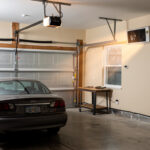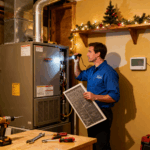
How to Keep Your Home Warm Without Sky-High Heating Bills
As temperatures drop, heating bills often rise and for many homeowners, winter can bring sticker shock when the utility bill
AC problems can happen to anyone, and often at the worst possible time. You may have a circuit breaker that is tripping for no apparent reason. Or maybe it’s just an inconvenience. Either way, it’s something you want to get taken care of before it becomes a bigger problem. Here are four reasons why your AC circuit breaker keeps tripping:
When you’re talking about AC circuit breakers, a short circuit is one of the most common causes of failure. Essentially, it’s when electricity flows through a path that isn’t supposed to be conducting current. It can happen in lots of ways: faulty wiring, frayed wires or even an object touching both parts of a circuit at once.
A short circuit might not cause any damage right away—it could just turn off your breaker and give you some warning that something needs to be fixed—but if left unattended long enough it could pose serious problems for your electrical system and home safety in general.
Your AC circuit breaker is designed to trip when the load is too high, and they can also become weaker over time. You may have noticed that an overloaded circuit breaker trips much faster than a new one with a lower load rating. This is because as it ages, its contacts inside get worn down and don’t close as easily or quickly. As these wear away over time, your electrical system becomes less efficient at handling higher loads such as air conditioning units or hot water heaters with electric elements on them (like heat strips).
Another common reason your breaker could be tripping is the compressor or fan attached to the condenser is drawing too many amps. The motor will draw more amps when it’s not running properly, and a failed fan can exasperate the issue by causing heat build up in the wiring; causing a breaker trip.
If you’ve replaced the capacitor and filter, but your AC circuit breaker still trips, it could be that the compressor or fan needs to be replaced. At this point it may be better to replace the unit altogether. Consult with a professional to determine the next best steps.
If you’re having trouble with your AC circuit breaker, keep an eye on the refrigerant pressure. High refrigerant pressures can cause a variety of issues. If there’s too much pressure in the system, for example, it could force coolant to leak out through the compressor and into other parts of your AC unit. In some cases, this leakage could lead to corrosion and other damage that causes further problems down the line.
When an AC circuit breaker trips, it can be dangerous. It’s important to keep in mind that an AC circuit breaker trip can cause electric shock, injury, and death for you or your loved ones. That’s why we recommend that if your AC unit has been tripping frequently or just stopped working altogether, you should call a professional technician instead of trying to fix the problem yourself. If you’re not sure how to identify a problem with your home’s electrical system before calling someone in for help, it’s best to call a professional anyway so they can properly diagnose what needs fixing.
This article is intended to give you a basic understanding of the causes of circuit breaker tripping in your home. If you think that your circuit breaker keeps tripping, it’s important to have a professional check it out right away. There are many reasons why this could be happening and not all of them can be fixed by yourself. If you notice any changes in your AC system or if it stops working altogether, call our team at Total Home Solutions, we provide 24/7 emergency services for all of your HVAC needs!

As temperatures drop, heating bills often rise and for many homeowners, winter can bring sticker shock when the utility bill

A garage heater is a game-changer during the colder months, keeping your workspace warm and comfortable. However, even the most

The holidays are a time for family, friends, and celebration but they can also put extra strain on your home’s